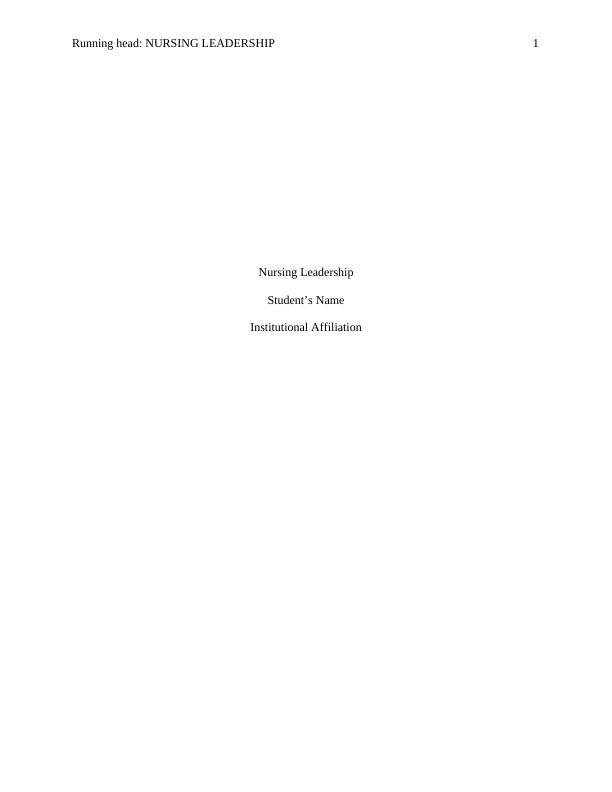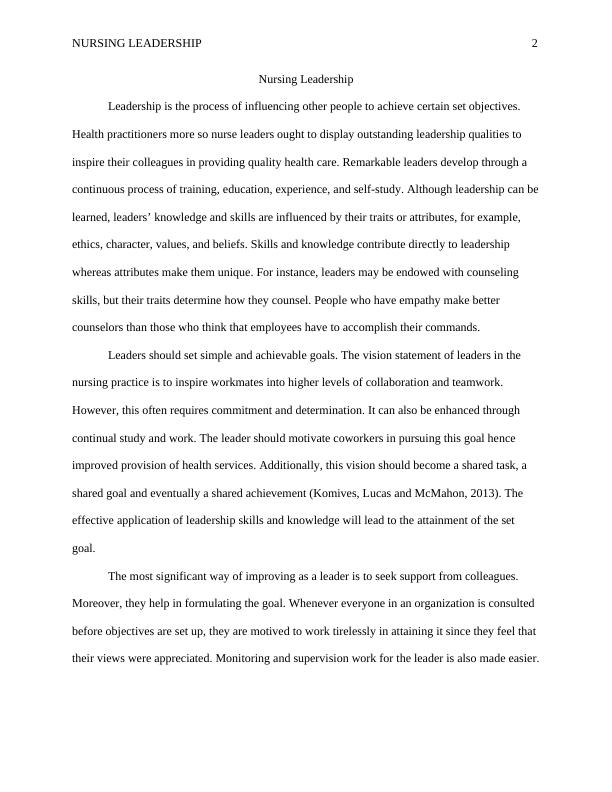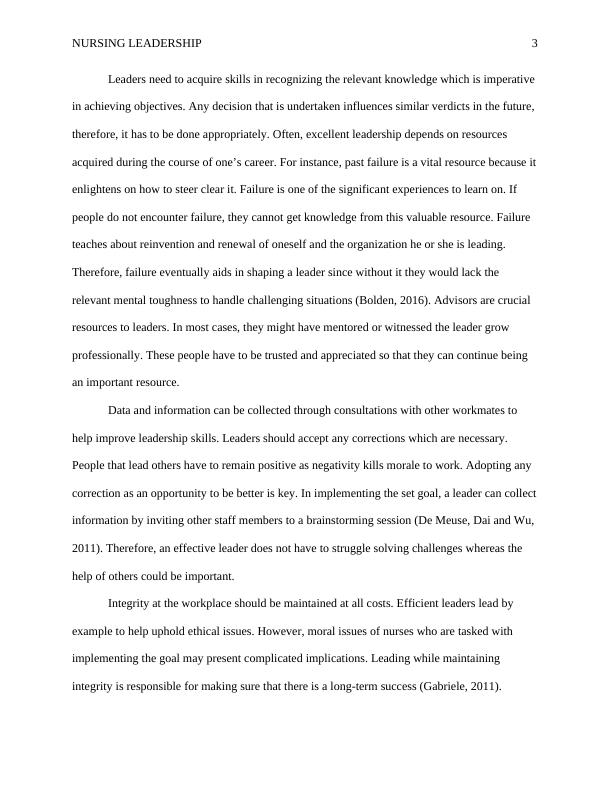Nursing Leadership
Added on 2023-06-14
9 Pages2175 Words457 Views
Running head: NURSING LEADERSHIP 1
Nursing Leadership
Student’s Name
Institutional Affiliation
Nursing Leadership
Student’s Name
Institutional Affiliation

NURSING LEADERSHIP 2
Nursing Leadership
Leadership is the process of influencing other people to achieve certain set objectives.
Health practitioners more so nurse leaders ought to display outstanding leadership qualities to
inspire their colleagues in providing quality health care. Remarkable leaders develop through a
continuous process of training, education, experience, and self-study. Although leadership can be
learned, leaders’ knowledge and skills are influenced by their traits or attributes, for example,
ethics, character, values, and beliefs. Skills and knowledge contribute directly to leadership
whereas attributes make them unique. For instance, leaders may be endowed with counseling
skills, but their traits determine how they counsel. People who have empathy make better
counselors than those who think that employees have to accomplish their commands.
Leaders should set simple and achievable goals. The vision statement of leaders in the
nursing practice is to inspire workmates into higher levels of collaboration and teamwork.
However, this often requires commitment and determination. It can also be enhanced through
continual study and work. The leader should motivate coworkers in pursuing this goal hence
improved provision of health services. Additionally, this vision should become a shared task, a
shared goal and eventually a shared achievement (Komives, Lucas and McMahon, 2013). The
effective application of leadership skills and knowledge will lead to the attainment of the set
goal.
The most significant way of improving as a leader is to seek support from colleagues.
Moreover, they help in formulating the goal. Whenever everyone in an organization is consulted
before objectives are set up, they are motived to work tirelessly in attaining it since they feel that
their views were appreciated. Monitoring and supervision work for the leader is also made easier.
Nursing Leadership
Leadership is the process of influencing other people to achieve certain set objectives.
Health practitioners more so nurse leaders ought to display outstanding leadership qualities to
inspire their colleagues in providing quality health care. Remarkable leaders develop through a
continuous process of training, education, experience, and self-study. Although leadership can be
learned, leaders’ knowledge and skills are influenced by their traits or attributes, for example,
ethics, character, values, and beliefs. Skills and knowledge contribute directly to leadership
whereas attributes make them unique. For instance, leaders may be endowed with counseling
skills, but their traits determine how they counsel. People who have empathy make better
counselors than those who think that employees have to accomplish their commands.
Leaders should set simple and achievable goals. The vision statement of leaders in the
nursing practice is to inspire workmates into higher levels of collaboration and teamwork.
However, this often requires commitment and determination. It can also be enhanced through
continual study and work. The leader should motivate coworkers in pursuing this goal hence
improved provision of health services. Additionally, this vision should become a shared task, a
shared goal and eventually a shared achievement (Komives, Lucas and McMahon, 2013). The
effective application of leadership skills and knowledge will lead to the attainment of the set
goal.
The most significant way of improving as a leader is to seek support from colleagues.
Moreover, they help in formulating the goal. Whenever everyone in an organization is consulted
before objectives are set up, they are motived to work tirelessly in attaining it since they feel that
their views were appreciated. Monitoring and supervision work for the leader is also made easier.

NURSING LEADERSHIP 3
Leaders need to acquire skills in recognizing the relevant knowledge which is imperative
in achieving objectives. Any decision that is undertaken influences similar verdicts in the future,
therefore, it has to be done appropriately. Often, excellent leadership depends on resources
acquired during the course of one’s career. For instance, past failure is a vital resource because it
enlightens on how to steer clear it. Failure is one of the significant experiences to learn on. If
people do not encounter failure, they cannot get knowledge from this valuable resource. Failure
teaches about reinvention and renewal of oneself and the organization he or she is leading.
Therefore, failure eventually aids in shaping a leader since without it they would lack the
relevant mental toughness to handle challenging situations (Bolden, 2016). Advisors are crucial
resources to leaders. In most cases, they might have mentored or witnessed the leader grow
professionally. These people have to be trusted and appreciated so that they can continue being
an important resource.
Data and information can be collected through consultations with other workmates to
help improve leadership skills. Leaders should accept any corrections which are necessary.
People that lead others have to remain positive as negativity kills morale to work. Adopting any
correction as an opportunity to be better is key. In implementing the set goal, a leader can collect
information by inviting other staff members to a brainstorming session (De Meuse, Dai and Wu,
2011). Therefore, an effective leader does not have to struggle solving challenges whereas the
help of others could be important.
Integrity at the workplace should be maintained at all costs. Efficient leaders lead by
example to help uphold ethical issues. However, moral issues of nurses who are tasked with
implementing the goal may present complicated implications. Leading while maintaining
integrity is responsible for making sure that there is a long-term success (Gabriele, 2011).
Leaders need to acquire skills in recognizing the relevant knowledge which is imperative
in achieving objectives. Any decision that is undertaken influences similar verdicts in the future,
therefore, it has to be done appropriately. Often, excellent leadership depends on resources
acquired during the course of one’s career. For instance, past failure is a vital resource because it
enlightens on how to steer clear it. Failure is one of the significant experiences to learn on. If
people do not encounter failure, they cannot get knowledge from this valuable resource. Failure
teaches about reinvention and renewal of oneself and the organization he or she is leading.
Therefore, failure eventually aids in shaping a leader since without it they would lack the
relevant mental toughness to handle challenging situations (Bolden, 2016). Advisors are crucial
resources to leaders. In most cases, they might have mentored or witnessed the leader grow
professionally. These people have to be trusted and appreciated so that they can continue being
an important resource.
Data and information can be collected through consultations with other workmates to
help improve leadership skills. Leaders should accept any corrections which are necessary.
People that lead others have to remain positive as negativity kills morale to work. Adopting any
correction as an opportunity to be better is key. In implementing the set goal, a leader can collect
information by inviting other staff members to a brainstorming session (De Meuse, Dai and Wu,
2011). Therefore, an effective leader does not have to struggle solving challenges whereas the
help of others could be important.
Integrity at the workplace should be maintained at all costs. Efficient leaders lead by
example to help uphold ethical issues. However, moral issues of nurses who are tasked with
implementing the goal may present complicated implications. Leading while maintaining
integrity is responsible for making sure that there is a long-term success (Gabriele, 2011).

End of preview
Want to access all the pages? Upload your documents or become a member.
Related Documents
Charismatic Leadership a Critical Perspectivelg...
|2
|481
|55
Leadership in Nursing: A Conceptual Approachlg...
|4
|862
|171
Nursing Leadershiplg...
|5
|1186
|380
Leadership and Innovation in Healthcare: Importance of Effective Leadership and Innovation for Change Managementlg...
|15
|3940
|86
Health Care and Quality Improvement Analysis 2022lg...
|5
|959
|25
Entrepreneurship and Small Business Management - Traits, Skills, and Reflectionslg...
|14
|950
|124
